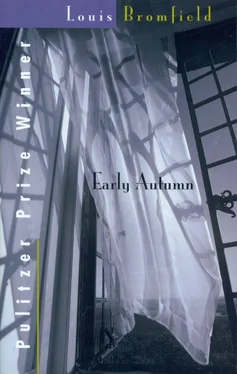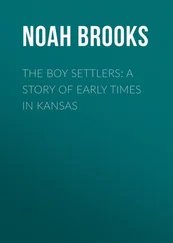“Always,” he said sadly. “It explains many things. … Sometimes I think that those of us who have lived since have had to atone for their sin. It’s all worked out in a harsh way, when you come to think of it. …”
She guessed what it was he meant. She saw again that he believed in such a thing as sin, that the belief in it was rooted deeply in his whole being.
“Have you got the letters, Olivia?” he asked.
“No … I burned them … last night … because I was afraid of them. I was afraid that I might do something shameful with them. And if they were burned, no one would believe such a preposterous story and there wouldn’t be any proof. I was afraid, too,” she added softly, “of what was in them … not what was written there, so much as the way it was written.”
He took her hand and with the oddest, most awkward gesture, kissed it gently. “You were right, Olivia dear,” he said. “It’s all they have … the others … that belief in the past. We daren’t take that from them. The strong daren’t oppress the weak. It would have been too cruel. It would have destroyed the one thing into which Anson poured his whole life. You see, Olivia, there are people … people like you … who have to be strong enough to look out for the others. It’s a hard task … and sometimes a cruel one. If it weren’t for such people the world would fall apart and we’d see it for the cruel, unbearable place it is. That’s why I’ve trusted everything to you. That’s what I was trying to tell you the other night. You see, Olivia, I know you … I know there are things which people like us can’t do. … Perhaps it’s because we’re weak or foolish—who knows? But it’s true. I knew that you were the sort who would do just such a thing.”
Listening to him, she again felt all her determination slipping from her. It was a strange sensation, as if he took possession of her, leaving her powerless to act, prisoning her again in that terrible wall of rightness in which he believed. The familiar sense of his strength frightened her, because it seemed a force so irresistible. It was the strength of one who was more than right; it was the strength of one who believed.
She had a fierce impulse to turn from him and to run swiftly, recklessly, across the wet meadows toward Michael, leaving forever behind her the placid, beautiful old house beneath the elms.
“There are some things,” he was saying, “which it is impossible to do … for people like us, Olivia. They are impossible because the mere act of doing them would ruin us forever. They aren’t things which we can do gracefully.”
And she knew again what it was that he meant, as she had known vaguely while she stood alone in the darkness before the figures of Higgins and Miss Egan emerged from the mist of the marshes.
“You had better go now and telephone to Anson. I fancy he’ll be badly upset, but I shall put an end to that … and Cassie, too. She had it all planned for the Mannering boy.”
2
Anson was not to be reached all the morning at the office; he had gone, so his secretary said, to a meeting of the Society of Guardians of Young Working Girls without Homes and left express word that he was not to be disturbed. But Aunt Cassie heard the news when she arrived on her morning call at Pentlands. Olivia broke it to her as gently as possible, but as soon as the old lady understood what had happened, she went to pieces badly. Her eyes grew wild; she wept, and her hair became all disheveled. She took the attitude that Sybil had been seduced and was now a woman lost beyond all hope. She kept repeating between punctuations of profound sympathy for Olivia in the hour of her trial, that such a thing had never happened in the Pentland family; until Olivia, enveloped in the old, perilous calm, reminded her of the elopement of Jared Pentland and Savina Dalgedo and bade her abruptly to stop talking nonsense.
And then Aunt Cassie was deeply hurt by her tone, and Peters had to be sent away for smelling salts at the very moment that Sabine arrived, grinning and triumphant. It was Sabine who helped administer the smelling salts with the grim air of administering burning coals. When the old lady grew a little more calm she fell again to saying over and over again, “Poor Sybil. … My poor, innocent little Sybil … that this should have happened to her!”
To which Olivia replied at last, “Jean is a fine young man. I’m sure she couldn’t have done better.” And then, to soften a little Aunt Cassie’s anguish, she said, “And he’s very rich, Aunt Cassie … a great deal richer than many a husband she might have found here.”
The information had an even better effect than the smelling salts, so that the old lady became calm enough to take an interest in the details and asked where they had found a motorcar to go away in.
“It was mine,” said Sabine dryly. “I loaned it to them.”
The result of this statement was all that Sabine could have desired. The old lady sat bolt upright, all bristling, and cried, with an air of suffocation, “Oh, you viper! Why God should have sent me such a trial, I don’t know. You’ve always wished us evil and now I suppose you’re content! May God have mercy on your malicious soul!” And breaking into fresh sobs, she began all over again, “My poor, innocent little Sybil. … What will people say? What will they think has been going on?”
“Don’t be evil-minded, Aunt Cassie,” said Sabine sharply; and then in a calmer voice, “It will be hard on me. … I won’t be able to go to Newport until they come back with the motorcar.”
“You! … You! …” began Aunt Cassie, and then fell back, a broken woman.
“I suppose,” continued Sabine ruthlessly, “that we ought to tell the Mannering boy.”
“Yes,” cried Aunt Cassie, reviving again. “Yes! There’s the boy she ought to have married. …”
“And Mrs. Soames,” said Sabine. “She’ll be pleased at the news.”
Olivia spoke for the first time in nearly half an hour. “It’s no use. Mr. Pentland has been over to see her, but she didn’t understand what it was he wanted to tell her. She was in a daze … only half-conscious … and they think she may not recover this time.”
In a whisper, lost in the greater agitation of Aunt Cassie’s sobs, she said to Sabine, “It’s like the end of everything for him. I don’t know what he’ll do.”
The confusion of the day seemed to increase rather than to die away. Aunt Cassie was asked to stay to lunch, but she said it was impossible to consider swallowing even a crust of bread. “It would choke me” she cried melodramatically.
“It is an excellent lunch,” urged Olivia.
“No … no … don’t ask me!”
But, unwilling to quit the scene of action, she lay on Horace Pentland’s Regency sofa and regained her strength a little by taking a nap while the others ate.
At last Anson called, and when the news was told him, the telephone echoed with his threats. He would, he said, hire a motorcar (an extravagance by which to gauge the profundity of his agitation) and come down at once.
And then, almost immediately, Michael telephoned. “I have just come down,” he said, and asked Olivia to come riding with him. “I must talk to you at once.”
She refused to ride, but consented to meet him halfway, at the pine thicket where Higgins had discovered the fox cubs. “I can’t leave just now,” she told him, “and I don’t think it’s best for you to come here at the moment.”
For some reason, perhaps vaguely because she thought he might use the knowledge as a weapon to break down her will, she said nothing of the elopement. For in the confusion of the day, beneath all the uproar of scenes, emotions and telephone calls, she had been thinking, thinking, thinking, so that in the end the uproar had made little impression upon her. She had come to understand that John Pentland must have lived thus, year after year, moving always in a secret life of his own, and presently she had come to the conclusion that she must send Michael away once and for all.
Читать дальше












